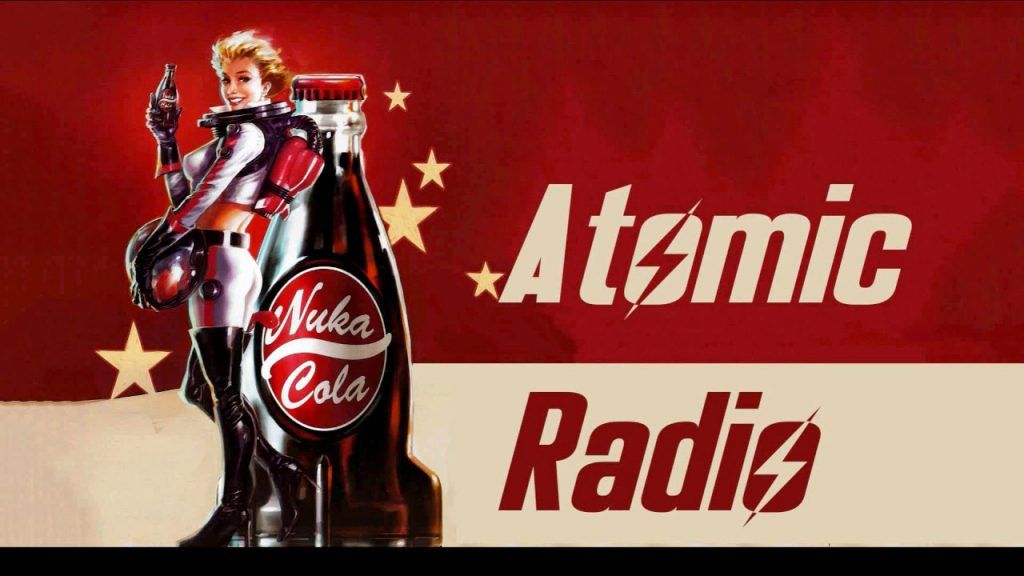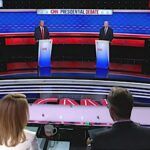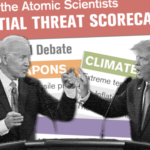Pop Music and the Bomb
By Reba A. Wissner | December 14, 2018
 The music is just as important a part of Fallout's satirical aesthetic as its references to Nuka-cola and retro-futuristic 1950s design. Image courtesy of Fandom.
The music is just as important a part of Fallout's satirical aesthetic as its references to Nuka-cola and retro-futuristic 1950s design. Image courtesy of Fandom.
“I will seek the desert’s hush
where the scenery is lush
How I long to see the mush…
room clouds.
‘Mid the yuccas
and the thistles,
I’ll watch the guided missiles,
While the old FBI
watches me.”
—Tom Lehrer, The Wild West is Where I Want to Be
(November 1959 live concert at the Kresge Auditorium on the MIT campus.)
If you’re going off to nuclear war (in a nuclear-themed video game), what kind of song would you want to accompany your march into battle—and your struggle to survive its radioactive aftermath? What’s the appropriate Battle Hymn of the Republic for the Jetsons-style atomic age?
Since the first inception of the Fallout video game series, the music was, and continues to be, a surprisingly powerful part of the allure of these games—which are an extremely popular franchise, containing mocking references to the Cold War that often seem tempered by a veneration of the destructive possibilities of nuclear firepower. The period music is just as important a part of the games’ satirical aesthetic as its references to nuclear-powered cars, Nuka-cola, and the use of retro-futuristic 1950s design: Actual, bona fide nuclear-themed songs from the Cold War play on its in-game radio stations.
And just as important, what do these songs tell us about American popular culture and its feelings toward nuclear weaponry, then and now? These songs certainly came from all over the American music scene, including country and western (such as 1961’s “A Mushroom Cloud”), gospel (1950’s “Jesus Hits Like an Atom Bomb”), pop music (1957’s “Atom Bomb Baby”), early rock-and-roll (1958’s “Uranium Rock”), blues (1945’s “Atomic Bomb Blues”), and protest songs (1959’s “We Will All Go Together When We Go”). It’s a question that came to the fore again last month, with the release of the latest in the 21-year old Fallout video game series, known as Fallout 76.
A retrospective on a retro game. Many iterations of Fallout have been released over the years, each with its own twists and turns. (While most of the press reports on the latest release have revolved around its technical disasters, including several irrecoverable bugs and glitches, other press reviews have focused on new features—such as the ability of the player to create nuclear codes and fire dormant nuclear missiles. Not surprisingly, Fallout 76 has also been criticized as trivializing nuclear war and minimizing the danger of nuclear weapons.) But all the games in the series invite players into a post-apocalyptic America. Although each game has its own unique quality and performative tasks in gameplay, all of them—with the exception of the mobile game, Fallout Shelter—have one attribute in common: the use of real nuclear-themed songs from the Cold War that play on the in-game radio stations.
Most elements of the game bear little relationship to the awful realities of the effects of the explosion of even a single, smallish one-kiloton nuclear bomb on a city; there is little-to-nothing realistic depicted in any of the games about blast effects, firestorms, pressure waves, radiation burns, long-term radioactive impact, and the ensuing nuclear winter. Nor is there much about the sheer numbers of the maimed and the dead.
And as one commentator noted earlier, “[W]hile there is no need for the series to become full-fledged anti-nuclear weapons education materials, it would help if the latest incarnation maintained the closer connections that the older entries had to the realities of our own nuclear age. Earlier Fallout games showed that a humorous treatment of nuclear weapons is possible without slipping into outright ambivalence about their implications. (And yes, one can indulge in dark satire and still be outraged by the dangers of nuclear weaponry; witness movies such as ‘Dr. Strangelove or: How I Learned to Stop Worrying and Love the Bomb.’)”
Far closer to reality is the use of a battery-operated radio that plays real songs from the Cold War. (To be sure, there would be no music playing on any radio during a real-life nuclear attack itself. And, depending on the time period within the Cold War, one might only hear an emergency radio broadcast.)
In Fallout 76, the built-in station known as Appalachia Radio features The Five Stars’ 1957 song “Atom Bomb Baby,” and The Commodores’ “Uranium.” Other versions of the series, such as Fallout 4, feature nuclear-themed songs like “Orange Colored Sky” by Nat King Cole and Stan Kenton (1950), “Crawl Out Through the Fallout” by Sheldon Allman (1960), “Uranium Fever” by Elton Britt (1955), and “Uranium Rock” by Warren Smith (1958) on Fallout 4‘s Diamond City Radio station. In each of these games, the player can tune to any station they choose and songs like these will play on the radio playlist on an endless loop until the user changes the station or turns the game’s “radio” off.
In addition to the built-in radio in each game, there is also a so-called Pip Boy, which is a full-fledged small, mobile computer with a built-in radio that players can tune to different stations in the imaginary world of the Fallout series. (In contrast to the regular radio in the game, one can think of a Pip Boy as a smartphone-like device that a player can strap to his or her arm. And just like a smartphone, the player can use it to stream material such as radio broadcasts. As for why it’s called “PIP”—in the extensive mythology surrounding the game, the letters are supposed to stand for “Personal Information Processor.”) In each game the stations are different, but the songs are relatively similar: They tend toward a 1940s and 1950s aesthetic, and many are atomic bomb-related.
In most of the games, the person playing relies on a DJ to announce the songs; over time, Fallout players have pieced together each station’s complete playlist. These playlist have proven so popular that avid players have developed their own Fallout-themed apps for the radio and the Pip Boy; one example is FalloutFM Radio. These user-contributed additions, known as modifications or “mods,” are somewhat like the souped-up, customized features that hot-rod enthusiasts make to their cars—only in this case, the creation of these aftermarket accessories has been taken on by the fans, hosted by Bethesda Games, and offered as additional, unofficial bonus features that the players can use in the game at their discretion. Mods have run the gamut from the addition of this atomic-related music to mock period advertisements; there is even a whole additional fan-created radio station in Fallout 4, known as Atomic Radio.
What do the songs say, and how? Some songs, such as “Orange Colored Sky,” recount the events during an atomic attack, using evocative words—flash, bam, alakazam—while we hear the sounds of glass crashing and ceilings collapsing.
Other songs, like “Crawl Out Through the Fallout,” mention specific, concrete details such as radiation poisoning and rising white blood cell counts. (At the same time, the narrator uses this device to persuade his lover, the only female survivor of nuclear warfare, to escape the rain of Strontium 90 to come back into his arms.) Meanwhile, “Atom Bomb Baby” compares his lover’s looks to the radioactivity of uranium.
And the two uranium songs used in the game, “Uranium Fever” and “Uranium Rock,” focus on a whole other aspect of the time: the uranium mining craze. “Uranium Fever” summed it up as:
“Uranium, uranium, uranium, uranium
I’m gonna dig it some more!
Ooby ooby ooby ooby
Oil’s old fashioned and gold don’t glitter no more
Well, diamonds so common, baby I’ll tell you the score”
Also on the game is The Ink Spots’ “I Don’t Want to Set the World on Fire” (1941) which, while written before the invention of the Bomb, could in the context of the game be read as a nuclear war song.
The enduring legacy of Cold War music can be demonstrated by the 2005 CD release of Atomic Platters, which features a large number of atomic bomb and nuclear-themed popular songs from the 1950s and 1960s. Some of them are featured in the Fallout games but many are not; it is telling that this album is not exhaustive and doesn’t include every one of these songs. Still, the closeness between the Atomic Platters CD and the Fallout games should not be underestimated, since there’s at least one playlist that combines the songs used on the CD with those in the games. Unsurprisingly, songs from Atomic Platters were used in some of the mods for the games.
Some of these songs ring with absurdity and revolve around things like biological mutation, such as George McKelvey’s “My Teenage Fallout Queen” (1964), which features the famous yet cringe-worthy line: “She holds my hands in both of hers/while the other one strokes my hair.”
In fact, biological mutation is a recurring theme, perhaps reflecting the dread of a new weapon that not only maims or kills, but permanently changes your very body (and those of all of your descendants).
Dark humor is another common thread; the songs of Tom Lehrer are probably the most famous of this strain, which includes “We Will All Go Together When We Go” (1959). There is a history of using absurdist humor to diffuse anxiety surrounding a cultural phenomenon or political event, and these songs are rooted in that tradition, as are some television shows of the era.
There was no shortage of atomic bomb songs written from the 1940s; the song “Atomic Cocktail” debuted in December 1945, the same month as the very first issue of the Bulletin of the Atomic Scientists and about four months after the bombings of Hiroshima and Nagasaki. There were at least 100 songs about atom bombs written from the 1940s through the 1960s, and the songwriters included such icons as Muddy Waters, with Homer Harris, in 1947’s “Atomic Bomb Blues.”
Atomic songs were found in all popular music genres, including country. One of the most popular country songs on this topic was Bodleaux Bryant’s “A Mushroom Cloud” (1961), which talks about how the atomic bomb is clouding the singer’s dreams of living a peaceful and content life. Even religious-themed and gospel music got in on the act with songs such as Lowell Blanchard and the Valley Trio’s “Jesus Hits Like an Atom Bomb” (1950) and the Swan’s Silvertone Singers’ “Jesus is God’s Atom Bomb” (1950). Some of these songs use humor as a way to deal with an uncertain reality, while others are grounded in religion—which is unsurprising, since the Bomb has often been discussed in tandem with religion, grounded in discourse of the Bomb as simultaneous creator and destroyer.
So why are these songs used as entertainment radio in a game about nuclear disaster? There are two reasons. First, to set the atmosphere. While none of these games take place during the times during which these songs were written (in fact, they all occur far in the future), they do illustrate a similar era, in which the threat of nuclear war ran rampant. For this reason, all of the other popular songs used in the games that are not about the Bomb are also from the 1940s to the 1960s, establishing an atmosphere and placing players in a very specific time period. It is important to consider that the entire franchise’s aesthetic is meant to suggest that the 1950’s nuclear household was the peak of American culture and the Vietnam War never happened.
Second, these songs are used in the game for the same reasons they were originally written: fascination with the bomb, and as a way to assuage America’s fears. These songs fostered a sense of community, then and now. In the game world, while you may be out exploring the wasteland, you have a sense that others are doing the same while listening to the same music. Outside the game, in the real world of the early Cold War, these songs fostered a collective experience, reflecting the pervasiveness of atomic anxiety at the time in which they were first released. They offered hypothetical and lighthearted scenarios that might occur if there were a nuclear attack, such as the lone woman left in Bill Haley and The Comets’ “Thirteen Women (and Only One Man in Town)” (1954). These songs were also part of the newly-established drive to create a shared atomic culture throughout the United States that was not limited to music but also spread to architecture and literature, among other aspects of American life.
Like this music, the Fallout series of games create a shared, collective experience among the players. Through these games, a new generation is introduced to these songs—some of which, let’s face it, have lyrics that are incredibly absurd and difficult to take seriously given their deliberately satirical slant. There are gameplayers who still don’t know these were “real” songs and thought they were written just for the Fallout games, probably because of the absurdity of the lyrics. People who are unaware of the cultural history of this music—or even the cultural history of the Cold War in general—tend to have a hard time understanding its importance. These songs form an aural snapshot of Cold War history not unlike the protest songs of roughly the same era; with the aid of modern popular culture genres like video games, they’re outlasting the era for which they were written, taking on a new relevance all their own.
It is also no coincidence that many of these these songs often used what has been described as Nukespeak, or the use of euphemisms, obfuscations, omissions, and other “linguistic cosmetics” to talk about the Bomb and make it less threatening. Originally coined by author Rory O’Connor and his colleagues in a book by the same name, Nukespeak refers to the bureaucratic practice of (mis)using language to whitewash any discussion of items related to the Bomb. Thus, he writes, an accident at a nuclear power plant was transformed into a “significant event.” Perhaps the most egregious example of Nukespeak occurred in the late 1950s, when US government officials pressed for the use of “sunshine units” as a measure of the amount of radioactive strontium 90 in human beings. (This particular Orwellian-ism apparently met with widespread public ridicule, and it largely disappeared after a few years.)
To be sure, the 1950s and 1960s were not the only decades that featured nuclear war songs: the 1980s had a handful of them. (Who can forget 1984’s “99 Red Balloons” by Nena?) Even now, in the first two decades of the twentieth century, with the possibility of nuclear war ever present once again, artists are using the topic in their songs. One only needs to look at “Nuclear War” by New Politics (2010), “The Stage” by Avenged Sevenfold (2016), “137” by Brand New (2017), and most recently, “So Long and Thanks for All the Fish” by A Perfect Circle (2018). Like their Cold War counterparts, these songs address the fear or nuclear annihilation, in some cases quite poetically, such as “Melt our joyous hearts away/Under the mushroom cloud confetti” (“So Long and Thanks for All the Fish”).
As Charles Wolfe put it in the album liner notes to the soundtrack for 1982’s The Atomic Cafe: “Bomb songs expressed people’s political hopes and fears, their religion, and even their sexual fantasies. People boogied with the Bomb, and they prayed with the Bomb… [They show] America trying to come to grips with the new atomic era. Just as important, it is a collection of seldom-heard vintage music which remains exciting and dynamic today.”
More than just a form of expression, these songs, no matter what the decade, have an element of catharsis, allowing people to sing along to lyrics about destruction while at the same time trying to forget about its possibility—however remote.
Or however close.
Together, we make the world safer.
The Bulletin elevates expert voices above the noise. But as an independent nonprofit organization, our operations depend on the support of readers like you. Help us continue to deliver quality journalism that holds leaders accountable. Your support of our work at any level is important. In return, we promise our coverage will be understandable, influential, vigilant, solution-oriented, and fair-minded. Together we can make a difference.
Keywords: mass media, nuclear anxiety, nuclear weapons, polular culture
Topics: Analysis, Personal Essay, Special Topics















“Also on the game is The Ink Spots’ “I Don’t Want to Set the World on Fire” (1941) which, while written before the invention of the Bomb, could in the context of the game be read as a nuclear war song.”
There could be an inspiration here to consider influences on future lines of scientific enquiry or technological invention of cultural/religious strains of thought in the lead up. Sort of a cultural history impact on the future, or ‘an idea whose time has come’. ‘set the world on fire’, Armageddon, etc.